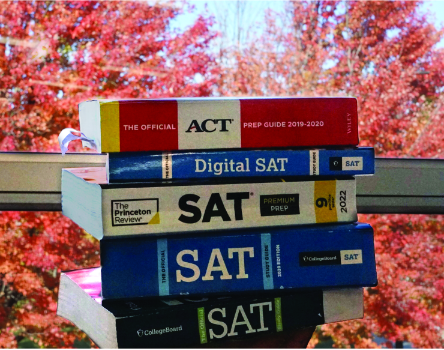
This school year, all juniors in Illinois are required to take the ACT instead of the SAT in the Spring due to a state mandated change.
According to a Frequently Answered Questions (FAQ) document posted by the Illinois State Board of Education (ISBE) in June 2024, a contract between ISBE and the College Board for the SAT ended this year on June 30. This contract was first made when ISBE’s previous contract with the ACT for a high school accountability assessment came to an end on June 30, 2015.
Prior to a contract like this expiring, ISBE begins to look for a new contract by evaluating three elements: technical specifications, commitment to diversity, and price. Ultimately, the ACT was the company that best fit these criteria and won out over the SAT.
Joseph O’Brien, associate principal, explained how D128 had no say in the change. This was a change initiated and determined by ISBE alone, and there is often a trickle down effect in how the change impacts the districts and individual schools.
As stated by O’Brien, in order to evaluate the success of this change, the data from student scores will be tracked, and comparisons between these scores and the SAT scores will be noted by D128.
This change is one that some staff members at VHHS are comfortable with. According to O’Brien, before the SAT was made the mandatory state test in Illinois in 2015, the ACT was the predominant test for all schools in the state. Teachers who were at VHHS during that time have experience with the format of the ACT, and some would embed ACT-style questions into the classwork to provide the students with more exposure to the test material.
Despite some staff members having prior experience with the ACT, not every student at VHHS can say the same. Caleb Lai (11) is one of the juniors who will be taking the ACT next spring. With the ACT being more math and science focused, Lai felt he was at a disadvantage.
“My pure skill level is higher in reading and writing compared to mathematics and science,” Lai said.
Along with the subject disadvantage, Lai finds that he has to spend extra time studying for both tests now, causing him to split the time he normally spends focusing on the SAT with the ACT. This change has added to his overall workload.
Lai also mentioned how this change does not benefit the students who choose to focus on the SAT, as they will end up paying more money to take the SAT outside of school.
Because the SAT used to be administered through the school, it was cost-free to students. Now students will have to pay money to take the SAT outside of school. Outside of school, one SAT test costs $68, and an ACT test costs $63.
Lai said he will end up paying more money to take three SAT tests out of school, compared to if he took one of the tests free at school.
Will Rendall (12) took both tests last year, taking the SAT with the school and the ACT outside of school. He was more ACT-focused, as he found that he scored better with the ACT.
Rendall advised students to take practice tests and really take time to learn the concepts on the ACT to better prepare for the actual test. He used a lot of prep books and had an ACT tutor, which helped him as well.
“The more you familiarize yourself with the way [the ACT] presents their questions and configures the test, the better you’ll be at it,” Rendall said.
According to the ISBE FAQ document, students will be provided with free, full-length practice tests, which they will be able to use to help prepare for the official ACT. The school is also in the process of creating more free student resources before the ACT in 2025.
“In general, the questions [on the ACT] are less difficult, but there is simply less time to answer them. The SAT is kind of the opposite, where you have a little bit more time [for each section], but the questions will be [more] difficult,” Ren-dall said.
